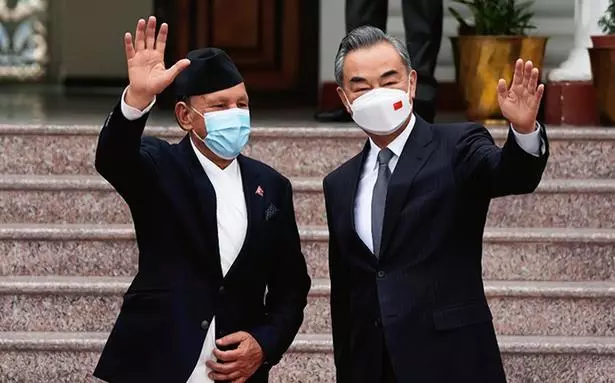Soon after Bangladesh raised the red flag about Chinese projects that fall under Beijing’s Belt and Road Initiative (BRI) , China is now pushing Nepal to fall in line, despite Kathmandu’s reluctance.
Wang Yi, the Chinese foreign minister and state councilor, called for finalisinng a BRI implementation plan when he met Nepali counterpart Narayan Khadka in Qingdao city on Wednesday evening, according to two Nepali officials who attended the meeting.
Khadka is on a three-day official visit to the northern neighbour at the invitation of Chinese foreign minister since Tuesday. This is the first high-level visit from Nepal to China since the five-party coalition government led by Sher Bahadur Deuba came to power in July last year.
In its statement, the Chinese foreign ministry said that the two foreign ministers agreed to negotiate and sign the implementation plan for the joint construction of the Belt and Road as soon as possible.
On the contrary, Nepal's foreign ministry, in its statement, refrained from taking any reference to the BRI implementation plan that the two sides discussed during the delegation level talks held on Wednesday.
"Yes, the Chinese side pressed for selecting projects under the BRI by giving final touch to the BRI implementation that Beijing sent to us last year. But, our foreign minister refrained from making any clear commitment towards it," said an official who attended the meeting between Wang and Khadka.
A source at the Nepal's foreign ministry clarified that the foreign minister chose not to make specific deals on the BRI believing that the country needs additional negotiations for finalising connectivity projects including the much-hyped cross-border Kerung-Rasuwagadhi railway.
"We need only grants not commercial loans under the BRI for developing connectivity projects. There is a deep fear among the political leadership that Nepal also may slip into a debt trap like another South Asian neighbour Sri Lanka if it accepts commercial loans from China," the source clarified.
Nepal had signed a Memorandum of Understanding (MoU) on the Belt and Road with China in May 2017. However, it has not implemented a single project under the BRI yet.
During Wednesday's talks, foreign minister Khadka, however, agreed to expedite China-supported development projects in Nepal.
Nepal reiterates One China Policy
In his talks with the Nepali foreign minister also expressed the country's commitment to "One China Policy", days after China sought international support for its position on the Taiwan issue which flared up after the unannounced visit of US House Speaker Nancy Pelosi to the self-ruled island earlier last week.
"Minister Khadka reiterated Nepal’s unwavering commitment to One China Policy and assured that the Nepali territory will not be allowed to be used for any activity against China," read a statement issued by Nepal's foreign ministry.
Earlier on August 3, Chinese Ambassador Hou Yanqi sought Nepal's support on the Taiwan issue, recalling the country's long-standing commitment to One China Policy. The envoy appreciated Nepal’s longstanding commitment to the One-China principle and resolute opposition to “Taiwan Independence”.
During Wednesday's delegation level talks with the Nepali counterpart, Wang reiterated China’s continued and unconditional support to Nepal’s sovereignty, independence and territorial integrity and assured to support in Nepal’s development endeavours as per the priority of the Nepali government, the ministry stated.
Nepal-China agree to expedite projects other than BRI
The two foreign ministers took stock of overall aspects of Nepal-China relations and cooperation and agreed to promote further cooperation in various sectors including trade, connectivity, investment, health, tourism, poverty alleviation, agriculture, disaster management, education, culture, and people-to-people exchanges, among others.
"Both sides expressed satisfaction over the progress made in a range of matters of bilateral cooperation since the official visit of the State Councilor to Nepal in March, 2022," read the statement issued by Nepal's foreign ministry.
China to provide 800 million Chinese Yuan grant
During the bilateral talks, Chinese foreign minister Wang announced to provide 800 million Chinese Yuan grant assistance to Nepal for the year 2022, according to the ministry.
Apart from other issues, the two foreign ministers expressed their commitment for the timely implementation of the agreements signed and understandings reached during high-level visits in the past.
"They agreed to expedite the implementation of China-assisted projects in Nepal. On this, the Chinese side assured the Nepali delegation that China will soon start the construction works of the second phase of Kathmandu Ring Road Improvement Project," read the statement.
The Kathmandu Ring Road Improvement Project has announced it will axe 2,057 trees along the 8.2km Kalanki-Balaju-Maharajgung road section from the next week as part of a drive to expand the road from three lanes to eight lanes.#RethinkRingRoad #SaveTrees #PlantationIsnottheoption pic.twitter.com/xDgeYOFWgp
— निराजन बन्जाडे (@BanjadeNirajan) August 27, 2019
Even as Nepal and Kathmandu have yet to finalize the investment modality of Nepal-China cross border railway project, Chinese side agreed to carry out the feasibility study of Keyrung-Kathmandu Railway under the grant assistance.
During the talks, the Chinese foreign minister assured support for pre-feasibility study of Nepal-China cross border transmission line as agreed during his official visit to Nepal in March this year.
On Wednesday, China also announced to provide 3 million Chinese Yuan worth of disaster relief materials in the support of people being affected by disasters and natural calamities in different parts of Nepal.
Additionally, China will also provide Nepal with additional 2 million RMB worth of medical items and logistics, according to the Nepali foreign minister.
Wrapping up a three-day visit, the Nepali foreign minister is returning home later Thursday.
Also Read: Nepal's foreign minister to seek deals outside BRI during China talks next week




















